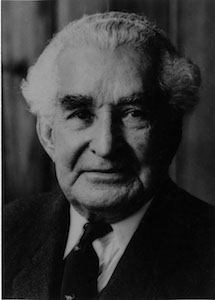The Right Excellent Sir Alexander Bustamante (1884 - 1977)

For thirty years, beginning in 1905, the restless Bustamante traveled extensively in the hemisphere particularly to Cuba, Panama , and the United States trying his hand at a variety of occupations including security work, dairy farming, transportation and pen keeping. It is believed that Bustamante made a considerable amount of money speculating on the Wall Street stock market. Back in Jamaica in the mid-thirties his money-lending business prospered, but while it gave him a livelihood it also opened his eyes to the appalling plight of the poor. Bustamante began participating in trade union activities before 1938 and developed a public reputation as a spokesman of the downtrodden. The violent labour disturbances during 1938 and his attempts to mediate and bring about a reduction in tension between the parties resulted in Bustamante being projected as the country’s “Labour Leader”. The authorities viewed him as a troublemaker and this resulted in his detention in 1938 and again in 1940.
The Bustamante Industrial Trade Union (BITU) was formed in 1939 and over the next few years Bustamante displayed charisma in his ability to gain significant benefits for the workers he represented. In the latter part of 1943 Bustamante followed the example set by Manley and used the membership of the BITU to build a political party. Bustamante’s success in negotiating substantial gains for large groups of workers fuelled further support for the Jamaica Labour Party and when the elections of December 1944 were held the party won with a land-slide victory.Later in 1962 when Jamaica became independent Bustamante was named the new nation’s first Prime Minister. One month later he married his private secretary, Miss Gladys Longbridge.
HONOURS
- He was awarded an honorary degree from the American University, Fairfield, Connecticut (1963)
- In 1966, the honorary degree of Doctor of Laws ‘honoris causa’ of the University of the West Indies was conferred on him. He was made a member of the Privy Council in 1963
- In 1966 Sir Alexander was awarded the National Order of Knight Grand Cross. He was also awarded the Distinguished Order of the Brilliant Star with special Grand Cordon by the Government of the Republic of China.
- In February 1968, the Jamaican House of Representatives and the Senate paid tribute to Sir Alexander. Later that month, the Bustamante Foundation was launched simultaneously in four countries, as a permanent and lasting memory of Sir Alexander’s services to Jamaica.
- In 1969, Sir Alexander became a member of the Order of National Hero; a life-size statue of him was erected at South Parade; his picture appears on the Jamaican one-dollar bill and his birthplace has been made a National Monument.
Two years after taking office as Prime Minister, then 80 years old, became ill. He never returned to active involvement in the affairs of state. He officially retired in 1967 and died on August 6, 1977 at the age of 93 years.
